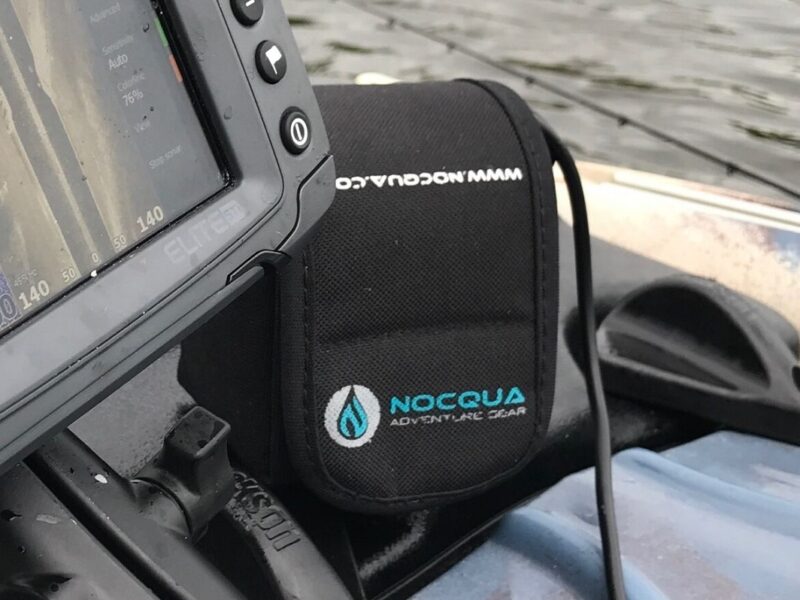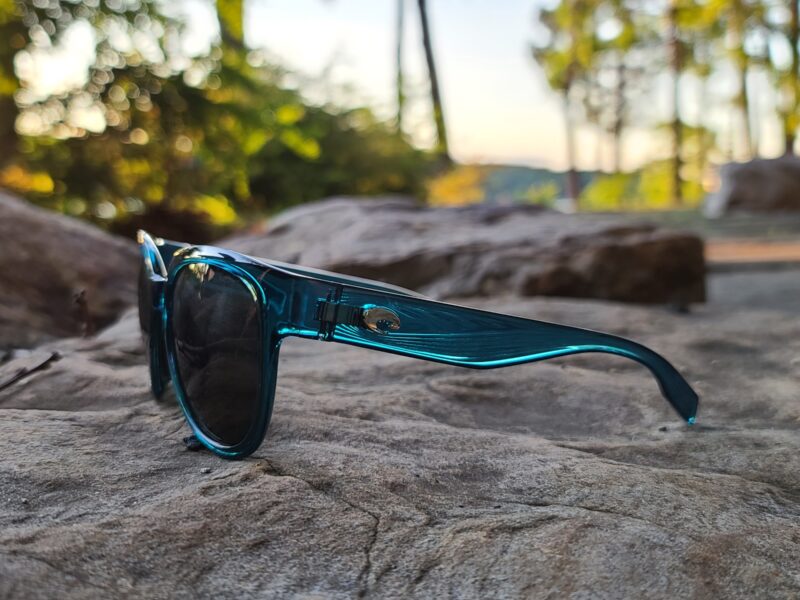
How To Choose A Kayak Trolling Motor Battery
A kayak trolling motor battery is an asset that can make or break your day of kayak fishing. The three specs to look for when choosing a battery for your kayak or canoe (canoes need trolling motor batteries too!) are battery type, battery power, and battery size and weight. These are the most important things to consider when you’re looking for the best kayak trolling motor battery.
Battery Type
There are three types of batteries that are suitable for use on your kayak trolling motor. There are other types, but due to concerns about the environment and the inability to handle harsh environments and motion from the water, they are not the best choice.
AGM Batteries
These batteries are often used as deep cycle or marine batteries because they work well regardless of their orientation. These are sealed batteries making them leak proof. One downside is that they are quite heavy, but their cheap cost and wide range of operating temperatures make up for this. You also will need to be sure not to discharge them more than 80% of it can damage the life of the battery. These are also referred to as AGM (absorbed glass mat) batteries. This is different than a standard flooded lead acid car battery which should never be used on a kayak or boat.
FLA Batteries
FLA is short for flooded lead-acid. This type of battery uses older technology, and honestly, because of their environmental concerns, they’re not the best choice for your kayak and the waters you paddle or fish in. We mainly put this here so you know what it is, and most likely avoid it.
Lithium-Ion Batteries
Lithium-ion batteries are the best type of battery out there. They also know it and they are expensive. They are light, compact, charge quickly, and will last a long time. Think about the battery in your phone, it’s the same kind. If you want the absolute best battery out there, go Lithium-ion.
Battery Power
What you really want to know is, “how long can I run my trolling motor with this battery?” You want to see if you can take your kayak 5 miles offshore and back while being safe. If you want to determine how long your battery will last it comes down to some simple math that involves current draw and amp-hours.
You will need the following two specs:
- Current draw from your trolling motor. This is listed in the manufacturer specs.
- You also need to know how many amp hours your battery is rated for, it will say this on the side.
Once you have these numbers do the math below
Battery Amp Hours
—————————————– = hours of run time
Trolling Motor Amp Draw
For Example: If you had a 100 amp-hour rated battery and a trolling motor with a 20 amp draw. You will have about 5 hours of run time. To make it ever easier, here is a table with estimates for trolling motor thrust and run time.
| Trolling Motor Thrust | Amp Draw - High Speed | Amp Draw - Medium Speed | Amp Draw - Low Speed | Runtime - High Speed | Runtime - Medium Speed | Runtime - Low Speed |
|---|---|---|---|---|---|---|
| 30lbs and less | 30 amps | 15 amps | 5 amps | 3.3 hours | 6.7 hours | 20 hours |
| 40lbs - 70lbs | 40 amps | 20 amps | 5 amps | 2.5 hours | 5 hours | 20 hours |
| 80lbs - 100lbs | 50 amps | 25 amps | 5 amps | 2 hours | 4 hours | 20 hours |
Battery Size and Weight
The size and weight of a kayak trolling motor battery is a huge deal. Even though you won’t be paddling as much with a trolling motor having a heavy kayak isn’t fun for anybody. And if you’re looking for a canoe trolling motor, you also want one that won’t take up so much space. Lithium-ion batteries will be the smallest and lightest weight option, but they also have the biggest price tag. However, with some of the batteries topping 60lbs on this list, you may want to consider a lightweight option.
Size is a factor that definitely comes into play on kayaks and canoes. The appeal of our small boats is to be able to get in and out quickly, and if you have to haul a big heavy battery around, pretty soon you might as well have a skiff.
Kayak Trolling Motor Batteries
Battery Reviews
This SLA battery is sort of like your ole reliable. It isn’t too expensive, gets the job done, but doesn’t have any features that blow us away. If you really aren’t worried about weight and size and just want to get out there and fish, this will get it done for you. It is backed by a 30-day refund policy and full 1-year warranty.
One of the positive reviews states “I have this battery paired with my Minn Kota Endura C2 30 and it lasts all day. All day meaning 4-5 hours of fishing. Last weekend I did a couple of full-speed runs for about 20+ minutes each and intermittent use over 5 hours and the battery didn’t die on me.”
Pros
- Low price for a solid battery
- Sealed battery that can handle marine environment
- Good run time
Cons
- It is a heavy battery
If you want to get the full battery package, this is your go-to. It comes with the VMAX Marine Battery Box, Waterproof Circuit Breaker, 12V 4-Stage Smart Charger and 9″ 100% Copper Cable. VMAX batteries are best known for their long life span, their capability to recover after repeated deep discharges is what makes them the favorite choice for any application. est 4-9 hours run time with 50-60% depth of discharge on 18-40lb trolling motors.
What online reviewers are saying – “Great starter for novice boaters. Comes with all you need to start a 12 Volt system for your canoe, boat, camper, or trailer. Following the instructions, you can set up a motor for your canoe or small boat. The charger is informative and understandable. My charger came with a cord that was wired wrong’ but customer service sent me a new (correct) cord the next day.”
Pros
- Comes with everything you need to get your trolling motor going and good instructions
- Affordable
- Company has multiple reviews of with excellent service
Cons
- Still a heavy battery
- Might not last as long if you need a 55lb trolling motor
The first lithium battery on our list — these lithium-ion batteries can continue for more than 3000 cycles and maintain 80% capacity after 3000 deep cycles. Most Lead-acid batteries only last for 300-400 cycles. The service life is more than 8 times that of lead-acid batteries. So yes it’s more expensive, but if you plan on using your trolling motors for years to come, this is what you want.
What are online reviews saying – This isn’t a joke, pulled from their review site “Using for kayak trolling motor. 5 Stars” Short and sweet.
Pros
- Smallest and lightest lithium battery on our list
- It provides up to 95% of their rated capacity while a lead-acid battery is usually limited to 50%
- Built-in BMS protects the cells from getting damaged
Cons
- Expensive option for a battery
- Only 30ah so may not power larger trolling motors for an all day trip
This is the big brother of the ECO-WORTHY 12V 30Ah. At 50Ah, this trolling motor battery should keep you out on the water most of the day no whatever what size motor your propelling. So take everything from above and make it better. The only downside is it makes it more expensive. However, like before, you’re investing in a good product to keep you safe and not stranded out on the water. It’s smart to spend money on things that keep you safe (and near the fish).
What online reviews are saying – “Lighter and smaller than the other batteries I was putting in my canoe. Works well, charges nicely, and also works with solar.”
Pros
- Lithium-iron battery that will keep your trolling motor running
- Sealed battery that can handle marine environment
- Solid power rating
Cons
- Expensive battery
- Does not include charger or wire connections
This is the best choice for a Lithium battery. ExpertPower has great reviews and is widely used by kayak anglers for trolling motors. A battery that can handle trolling motor demand keep going is one that you want to use since that shows it can handle almost anything. This battery can handle a 100% discharge rate because it is a lithium battery and it won’t impact the life of the battery. It also is rated from 2500-7000 power cycles and a 10 year lifetime. Great specs and a great battery for the water!
What online reviews are saying – “I’m a competitor in kayak bass fishing and recently installed a 35lb. thrust trolling motor on my tournament kayak.
Being a survey boat captain I have an OCD to have reliable equipment on all my vessels! So, I started my research on quality lithium batteries at a fair price. Narrowing it down to 2 batteries I chose Expert Power not going with the more popular company with the majority of the KBF anglers.”
Pros
- Power rating is excellent
- Small form factor and lightweight
- Lithium ion battery excellent for marine electronics
- Reputable company with quality products
Cons
- Needs a waterproof case for kayak use
- Does not include charger or wire connections
You’ll notice only one of the batteries above comes with the connection to get you out on the water immediately. Well, in order to connect your battery to a trolling motor you’ll need wires and a waterproof case. Most likely we’ll write a whole other article about the best boxes to use, but for now, this will get you out of the water. Be sure to note that this does not include a battery, but it makes any battery you buy quick to setup and use!
Pros
- Power rating is excellent
- Small form factor and lightweight
- Lithium ion battery excellent for marine electronics
- Reputable company with quality products
Cons
- Needs a waterproof case for kayak use
- Does not include charger or wire connections
Check out our other articles about Kayak Fishing:
- HOW TO FIND KAYAK FISHING SPOTS
- KAYAK FISHING CLOTHES – A GUIDE ON WHAT TO WEAR
- BEST LIFE JACKETS FOR KAYAK FISHING
- THE BEST STAKEOUT POLES FOR YOUR KAYAK, SUP, OR CANOE
- A GUIDE TO THE BEST KAYAK AND CANOE CARTS
- TOP 5 KAYAK FISHING PADDLES OF 2021
- BUYING A USED FISHING KAYAK: 10 YEARS OF EXPERIENCE
- HOW TO CHOOSE A KAYAK PADDLE FOR FISHING
- BEST FISHING KAYAKS
- YOUR KAYAK FISHING GEAR CHECKLIST
- KAYAK FISHING WITH GATORS
- Posted In:
- Kayak Fishing
- Kayak Gear
- Reviews
Wesley Anderson
Wesley lives in Georgia and has spent the last 30 years hiking, camping, and fishing. Wesley has been in the fishing online industry since 2011 and loves sharing his knowledge of fishing products and fishing techniques. In order to give readers hands on knowledge, we've put hundreds on products to the test.
All stories by: Wesley Anderson












